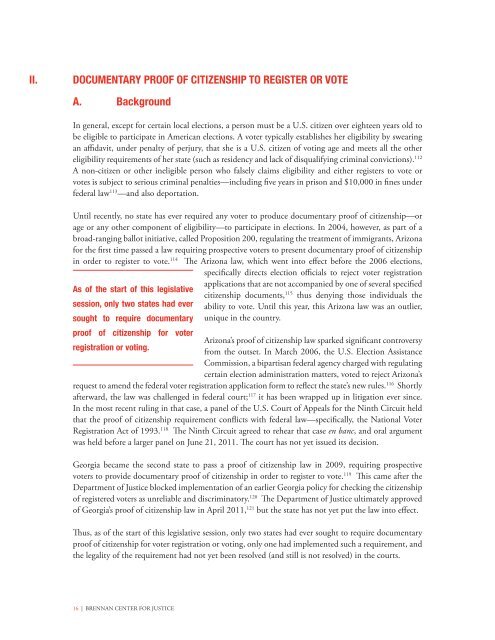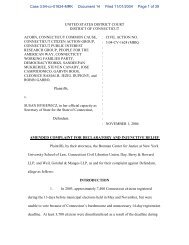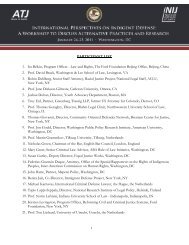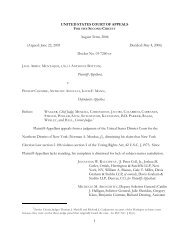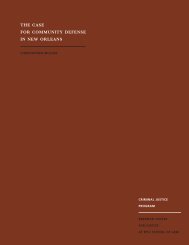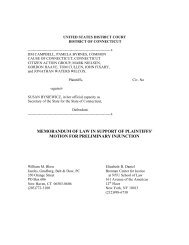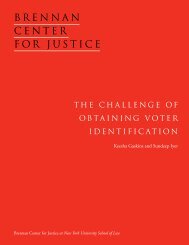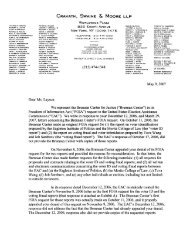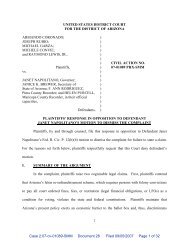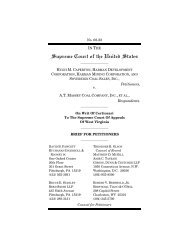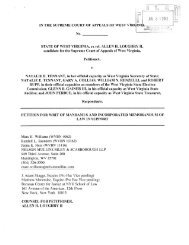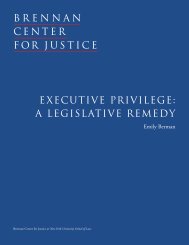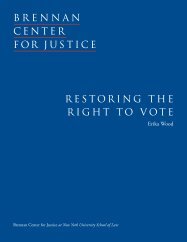BRENNAN CENTER FOR JUSTICE
BRENNAN CENTER FOR JUSTICE
BRENNAN CENTER FOR JUSTICE
Create successful ePaper yourself
Turn your PDF publications into a flip-book with our unique Google optimized e-Paper software.
II.<br />
DOCUMENTARY PROOF OF CITIZENSHIP TO REGISTER OR VOTE<br />
A. Background<br />
In general, except for certain local elections, a person must be a U.S. citizen over eighteen years old to<br />
be eligible to participate in American elections. A voter typically establishes her eligibility by swearing<br />
an affidavit, under penalty of perjury, that she is a U.S. citizen of voting age and meets all the other<br />
eligibility requirements of her state (such as residency and lack of disqualifying criminal convictions). 112<br />
A non-citizen or other ineligible person who falsely claims eligibility and either registers to vote or<br />
votes is subject to serious criminal penalties—including five years in prison and $10,000 in fines under<br />
federal law 113 —and also deportation.<br />
Until recently, no state has ever required any voter to produce documentary proof of citizenship—or<br />
age or any other component of eligibility—to participate in elections. In 2004, however, as part of a<br />
broad-ranging ballot initiative, called Proposition 200, regulating the treatment of immigrants, Arizona<br />
for the first time passed a law requiring prospective voters to present documentary proof of citizenship<br />
in order to register to vote. 114 The Arizona law, which went into effect before the 2006 elections,<br />
specifically directs election officials to reject voter registration<br />
applications that are not accompanied by one of several specified<br />
As of the start of this legislative<br />
citizenship documents, 115 thus denying those individuals the<br />
session, only two states had ever ability to vote. Until this year, this Arizona law was an outlier,<br />
sought to require documentary unique in the country.<br />
proof of citizenship for voter<br />
Arizona’s proof of citizenship law sparked significant controversy<br />
registration or voting.<br />
from the outset. In March 2006, the U.S. Election Assistance<br />
Commission, a bipartisan federal agency charged with regulating<br />
certain election administration matters, voted to reject Arizona’s<br />
request to amend the federal voter registration application form to reflect the state’s new rules. 116 Shortly<br />
afterward, the law was challenged in federal court; 117 it has been wrapped up in litigation ever since.<br />
In the most recent ruling in that case, a panel of the U.S. Court of Appeals for the Ninth Circuit held<br />
that the proof of citizenship requirement conflicts with federal law—specifically, the National Voter<br />
Registration Act of 1993. 118 The Ninth Circuit agreed to rehear that case en banc, and oral argument<br />
was held before a larger panel on June 21, 2011. The court has not yet issued its decision.<br />
Georgia became the second state to pass a proof of citizenship law in 2009, requiring prospective<br />
voters to provide documentary proof of citizenship in order to register to vote. 119 This came after the<br />
Department of Justice blocked implementation of an earlier Georgia policy for checking the citizenship<br />
of registered voters as unreliable and discriminatory. 120 The Department of Justice ultimately approved<br />
of Georgia’s proof of citizenship law in April 2011, 121 but the state has not yet put the law into effect.<br />
Thus, as of the start of this legislative session, only two states had ever sought to require documentary<br />
proof of citizenship for voter registration or voting, only one had implemented such a requirement, and<br />
the legality of the requirement had not yet been resolved (and still is not resolved) in the courts.<br />
16 | Brennan Center for Justice


